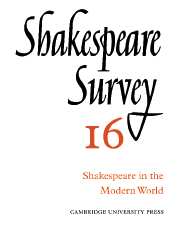Book contents
- Frontmatter
- An Obligation to Shakespeare and the Public
- Our Closeness to Shakespeare
- The Popularity of Shakespeare: An Examination of the Royal Shakespeare Theatre’s Repertory
- Shakespeare and the Fashion of These Times
- An Approach to Shakespearian Tragedy: The ‘Actor’ Image in Macbeth
- Shakespeare’s Impact Today in France
- Shakespeare and the Modern World
- Modern ‘Theatrical’ Translations of Shakespeare
- Shakespeare as ‘Corrupter of Words’
- Shakespeare in Ghana
- ‘Timon of Athens’
- Who Strutted and Bellowed?
- Shakespeare in Planché’s Extravaganzas
- ‘Our Will Shakespeare’ and Lope de Vega: An Unrecorded Contemporary Document
- Shakespeare and the Mask
- International Notes
- Shakespeare Productions in the United Kingdom: 1961
- Acting Shakespeare Today. A review of performances at the Royal Shakespeare Theatre, August 1962
- Canada’s Achievement
- 1 Critical Studies
- 2 Shakespeare’s Life, Times and Stage
- 3 Textual Studies
- Books Received
- Index
- Plate section
Modern ‘Theatrical’ Translations of Shakespeare
Published online by Cambridge University Press: 28 March 2007
- Frontmatter
- An Obligation to Shakespeare and the Public
- Our Closeness to Shakespeare
- The Popularity of Shakespeare: An Examination of the Royal Shakespeare Theatre’s Repertory
- Shakespeare and the Fashion of These Times
- An Approach to Shakespearian Tragedy: The ‘Actor’ Image in Macbeth
- Shakespeare’s Impact Today in France
- Shakespeare and the Modern World
- Modern ‘Theatrical’ Translations of Shakespeare
- Shakespeare as ‘Corrupter of Words’
- Shakespeare in Ghana
- ‘Timon of Athens’
- Who Strutted and Bellowed?
- Shakespeare in Planché’s Extravaganzas
- ‘Our Will Shakespeare’ and Lope de Vega: An Unrecorded Contemporary Document
- Shakespeare and the Mask
- International Notes
- Shakespeare Productions in the United Kingdom: 1961
- Acting Shakespeare Today. A review of performances at the Royal Shakespeare Theatre, August 1962
- Canada’s Achievement
- 1 Critical Studies
- 2 Shakespeare’s Life, Times and Stage
- 3 Textual Studies
- Books Received
- Index
- Plate section
Summary
Many historians of the theatre and drama have been attracted by the study of stage versions because they certainly are the most important relics of the performances of the past. They contain thousands of details characteristic of the taste of the artists who used them and of the audiences that enjoyed them. With the necessary tact and caution they can be interpreted as first-rate period pieces from which inferences concerning general tendencies can be drawn.
Studies of this kind have left the present writer with one very strong impression: Shakespeare's plays cannot only be considered as theatrical material to be given a new shape and stage reality by every succeeding generation. Nor are they merely a passive measuring rod by which we can recognize the stature of an age; they are mute, but strict, judges pronouncing sentence on the imaginative grasp and the sensibility of every generation of artists and spectators. Like the stage versions, the translations accepted by a considerable number of theatres can be viewed as period pieces. The German translation by Schlegel and Tieck is a supreme example of one; it is a period piece, however, which has long outlived its fashion and its age. It continues the most frequently acted version in Germany, Austria, and Switzerland in spite of its shortcomings, discussed by many a critic, only recently by Margaret Atkinson.1 Among them we may recall the facts that these versions are based upon the limited scholarship of the eighteenth century, that they contain obsolete and old-fashioned expressions and, finally, that they are a perfect expression of the poetic mode of the Goethe-Zeit.
- Type
- Chapter
- Information
- Shakespeare Survey , pp. 63 - 69Publisher: Cambridge University PressPrint publication year: 1963

